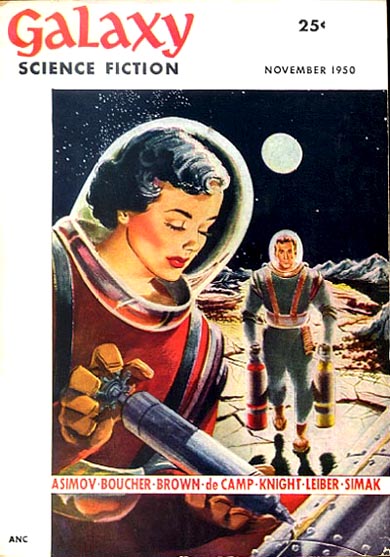|
Science Fiction Carnival
''Science Fiction Carnival'' is an anthology of humorous science fiction stories edited by American writers Fredric Brown and Mack Reynolds. It was published by Shasta Publishers in 1953 in an edition of 3,500 copies. Most of the stories originally appeared in the magazines ''Super Science Stories'', ''Fantasy and Science Fiction'', ''Astounding'', '' Worlds Beyond'', ''Slant'', ''Imagination'', ''Space Science Fiction'', ''Thrilling Wonder Stories'' and ''Blue Book''. Contents * Introduction, by Fredric Brown * Preface, by Mack Reynolds *"The Wheel of Time", by Robert Arthur *"SRL Ad", by Richard Matheson *"A Logic Named Joe", by Murray Leinster *"Simworthy’s Circus", by Larry Shaw *"The Well-Oiled Machine", by H. B. Fyfe *"Venus and the Seven Sexes", by William Tenn *"The Swordsmen of Varnis", by Clive Jackson *"Paradox Lost", by Fredric Brown *"Muten", by Eric Frank Russell *"The Martians and the Coys", by Mack Reynolds *"The Ego Machine", by Henry Kuttner *"The Cosmic Ja ... [...More Info...] [...Related Items...] OR: [Wikipedia] [Google] [Baidu] |
Fredric Brown
Fredric Brown (October 29, 1906 – March 11, 1972) was an American science fiction, fantasy, and mystery writer.D. J. McReynolds, "The Short Fiction of Fredric Brown" in Frank N. Magill, (ed.) ''Survey of Science Fiction Literature'', Vol. 4. Englewood Cliffs, NJ: Salem Press, 1979. (pp. 1954–1957). He is known for his use of humor and for his mastery of the " short short" form—stories of 1 to 3 pages, often with ingenious plotting devices and surprise endings. Humor and a postmodern outlook carried over into his novels as well. One of his stories, "Arena", was adapted to a 1967 episode of the American television series ''Star Trek''. According to his wife, Fredric Brown hated to write. So he did everything he could to avoid it. He'd play his flute, challenge a friend to a game of chess, or tease Ming Tah, his Siamese cat. If Brown had trouble working out a certain story, he would hop on a long bus trip and just sit and think and plot for days on end. When Brown fin ... [...More Info...] [...Related Items...] OR: [Wikipedia] [Google] [Baidu] |
Blue Book (magazine)
''Blue Book'' was a popular 20th-century American magazine with a lengthy 70-year run under various titles from 1905 to 1975. Ashley, Mike, "Blue Book—The Slick in Pulp Clothing". ''Pulp Vault'' Magazine, No. 14. Barrington Hills, IL: Tattered Pages Press, 2011: pp. 210–53. It was a sibling magazine to '' The Red Book Magazine'' and ''The Green Book Magazine''. Launched as ''The Monthly Story Magazine'', it was published under that title from May 1905 to August 1906 with a change to ''The Monthly Story Blue Book Magazine'' for issues from September 1906 to April 1907. In its early days, ''Blue Book'' also carried a supplement on theatre actors called "Stageland". The magazine was aimed at both male and female readers. For the next 45 years (May 1907 to January 1952), it was known as ''The Blue Book Magazine'', ''Blue Book Magazine'', ''Blue Book'', and ''Blue Book of Fiction and Adventure''. The title was shortened with the February 1952 issue to simply ''Bluebook'', continuin ... [...More Info...] [...Related Items...] OR: [Wikipedia] [Google] [Baidu] |
